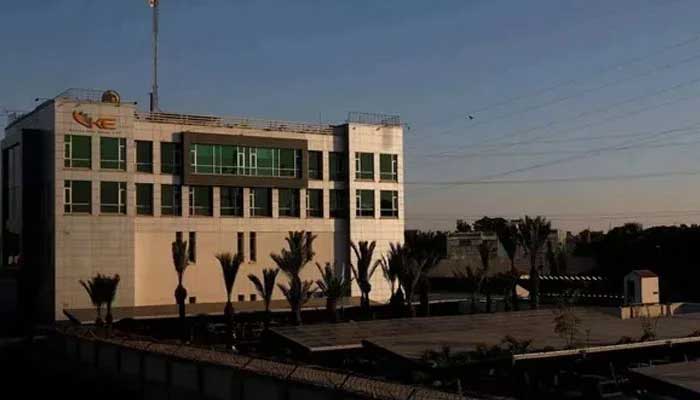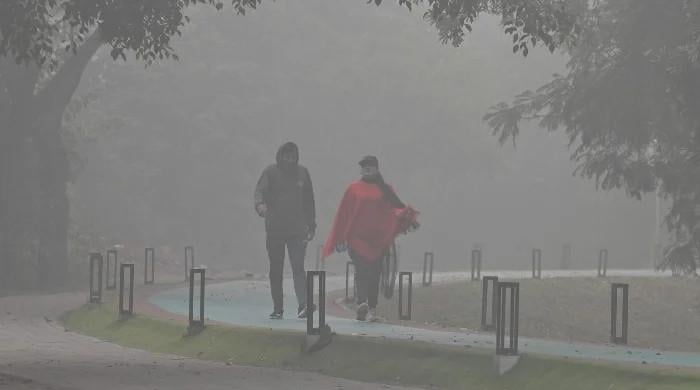Leaked documents expose KE's real ownership structure
Certified document contains detailed ownership information and structure details, exposing true extent of IGCF's involvement in KE
September 03, 2023

LONDON: K-Electric (KE) Chairman Mark Skelton has certified that Shaheryar Arshad Chishty’s indirect beneficial ownership in the company, through the Infrastructure and Growth Capital Fund (IGCF), is only 5.1% — a startling turn of events that contradicts previous numerous portrayals by the fund as a majority shareholder in KE.
Leaked documents from Alvarez and Marsal, a renowned international consulting firm, show that Shaheryar Arshad Chishty indirectly is an LP (Limited Partner) of the IGCF “with a 5.1 % indirect interest in KE”.
The document, available with Geo News, is signed by Skelton who is the current KE chief and the Chairman of Cayman Island registered KES Power Limited (KESP) — the parent entity of KE.
Skelton also holds the position as the director of IGCF General Partner Limited, which manages the IGCF Fund. He is also the managing director of Alvarez and Marsal Europe LLP.
The document, carrying the revelation, was signed by the KE and KESP chairman on July 11, 2023, for legal filing. The verified document is titled “KES Power Limited (IGCF) — entities holding greater than 5% economic beneficial (indirect) interest in KE as of 11 July 2023.”
A debate has raged in Pakistani media in recent months where Shaheryar Arshad Chishty claimed he has become the “majority” owner of KE Limited, with numerous reports suggesting that he holds a substantial ownership stake in the company.
The original Saudi and Kuwaiti investors, Al-Jomaih and NIG, have throughout rejected the claim saying they hold over 30.7% indirect share in the power company and that the majority ownership claim by Shehryar Shaheryar Arshad Chishty is misleading. This notion has now been reinforced by the certified document from the chairman of KE and KESP.
The leaked document, obtained from anonymous sources, provides undeniable evidence as it carries the signatures of Skelton, the chairman of KE, and raises several questions.
The certified document contains detailed ownership information and structure details that expose the true extent of IGCF's involvement in KE. The certified document also reveals that approximately 30% of IGCF SPV 21, the third shareholder in KESP (apart from the Saudi and Kuwait groups), is held by Mashreq Bank.
This effectively translates into Mashreq Bank holding 10.5% indirect stake in KE. Comparing this to the ownership stake of Shaheryar Arshad Chishty as a Limited Partner / Investor in the IGCF, Shaheryar Arshad Chishty’s see-through ownership turns out to be only 5.1% i.e., less than half of that of Mashreq Bank.
Shaheryar Arshad Chishty’s economic stake in KE comes about from purchasing Limited Partners interests from various investors in the IGCF. Originally there were over eighty investors in the IGCF established in 2008.
Hence the pecking order of indirect ownership in KE would start at the top with the largest chunk held by the original investors in KE, since the time of Privatization back in 2005, being the Saudi and Kuwait conglomerates (30.7%).
Next in line would be Mashreq Bank (10.5%) which sort of inherited the stake due to the misfortunes of Abraaj group now in liquidation. The smallest portion, of these four groups, belongs to Shaheryar Arshad Chishty (5.1%) through his offshore entity in the British Virgin Islands (BVI).
Skelton didn’t respond to questions for this article.
The ongoing current over the nomination of directors to the board of KE is between the two large groups of shareholders of KES Power, the holding company.
Shaheryar Arshad Chishty’s IGCF-owned SPV-21 Ltd claims it controls a 53.8% shareholding in KES Power. All others dispute this claim and say such a claim is nothing but false representation. The matter is before a court in Cayman Islands and it looks like the legal wrangling will go on for many months.











